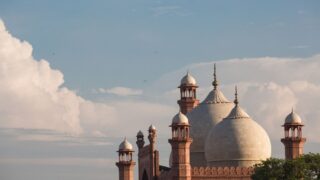Fasting is prescribed to every Muslim in the month of Ramadan, the ninth month of the lunar year. During this period Muslims do not eat a grain of food nor drink a drop of water from dawn to dusk, no matter how hungry or thirsty they feel. It is faith in Allah, the only One Almighty of the universe, that makes us voluntarily undergo such rigorous training. Fasting does not just mean keeping ourselves away from food and water the whole day.
During the time of fasting we have to suppress our passions and desires and keep ourselves away from all kinds of evil thoughts and deeds. The incessant fasting of a whole month inculcates in us the consciousness of duty and the spirit of patience. Rigor and discipline during this month brings us face-to-face with the realities of life and help us to make our life during the rest of the year a life of true subservience to Allah’s will.
Fasting has its immense impact on society, for all Muslims irrespective of their status must fast during the same month, whether it falls in hottest summer or coldest winter. This creates amongst Muslims a sentiment of life and brotherhood. During the month of Ramadan evil conceals itself while good comes to the fore, and the whole atmosphere is filled with piety and purity. Prophet Muhammad (peace and blessings be upon him) said, “Fasting is a shield for you (as it saves you from sins in this world and protects you from hell in the hereafter)” (Muslim).
“When any one of you is observing fast, he should neither use indecent language nor speak loudly. If someone kicks up a row and abuses him, he should tell him that he is observing fast” (Muslim). It means that although a Muslim has to always shun abuse and altercations, it becomes all the more essential when he keeps fast.
Piousness is the real touchstone of fasting. Abstinence from eating, drinking, and sexual pleasure means that the Muslim should devote his time to Allah. Otherwise his fasting is nothing but starvation. Abstinence from food, drink, sexual acts, and evil thinking is a mark and technical form of fasting. The Prophet (peace and blessings be upon him) said, “There are many who fast who will get nothing from the fast except hunger and thirst” (Ad-Darimi) and, “If a person does not abstain from telling lies or doing wrong when he is observing the fast, let it be known to him that Allah does not want that he should be hungry” (Al-Bukhari).
Fasting creates a wave of sympathy and fellow feeling in society. The rich are made to experience the pangs of poverty for one month continuously. At least for thirty days fasting reminds them of the hardship of starvation and hunger. This creates in them a determination to help the poor. For this reason the Prophet regarded this month as the month of sympathy.
Fasting inculcates the sense of equity. During the month of Ramadan all fellow beings of the Muslim Ummah, the rich and the poor, the ruler and the ruled, the elite and the ordinary, are in a similar position. They all share the equal level of responsibility of obedience.
Let us welcome the month of Ramadan seeking the blessing of Allah.


















